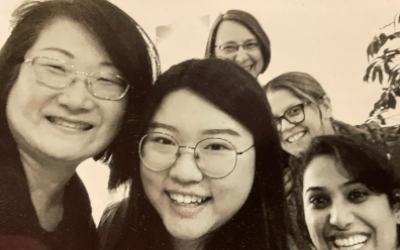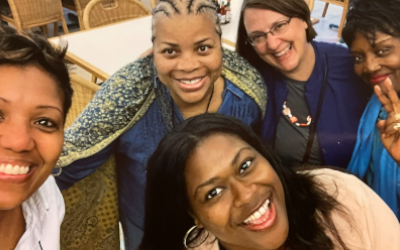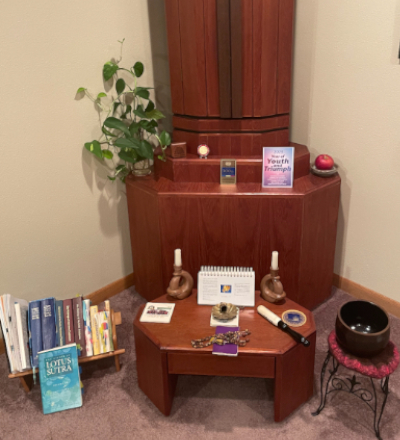Two women within the local branch of Soka Gakkai International Buddhists in Madison overcame personal struggles and found lifelong friendships through SGI Buddhism. The local organization works together to educate and promote peace, interfaith, and multiculturalism. SGI is a priestless, universal organization of Japanese Lay Buddhism that highlights the philosophy of promoting peace and finding ultimate happiness within your life and yourself. SGI is the largest Lay Buddhist organization in the world, the local group in Madison consists of 250 members, including Carol Weiss, 66, and Kilsa Dremsa, 60.
Personal Journeys:
Weiss, one of the local branch leaders, originally from Wisconsin, was a senior in high school struggling with chronic depression when she was introduced to SGI Buddhism after befriending a musician in the Twin Cities during the 70s.

As a former Catholic, Weiss was immediately intrigued by the idea of a priestless religion with no strict rules that succeeded in making people she knew happy. “I went back to a tiny town and started chanting on my own,” Weiss said. Dremsa, originally from Brazil, was also struggling with depression when she was introduced to SGI. Also a former follower of Catholicism, Dremas’ father brought her to speak with a Catholic priest, hoping to improve her mental health. After seeing no signs of improvement from medications and praying, Dremsa took a trip to France in her twenties. While staying with a Japanese family, Dremsa found the key to unlocking the happiness she had been seeking. That key was chanting.
The Practices:
The basic, daily practice for SGI members is chanting “Nam-myoho-renge-kyo” twice a day, which is done from their own homes. Dremsa and Weiss use chanting to manifest their desires and overcome any obstacles they face. Additionally, members read aloud sections of the Lotus Sutra. These practices are done to unlock the everlasting happiness, compassion, wisdom and courage within ourselves. “We know what our life feels like. We know what that voice in our head sounds like. And I found that when I was chanting, I was able to kind of shift things inside of me that felt negative,” said Weiss.

Discussion Meetings:
Members meet weekly for discussion meetings consisting of 10-20 people, kept small by intention. During meetings, members read and discuss the teachings from the writings of Nichiren, which highlight peace, interfaith and multiculturalism. Additionally, members open up and share personal thoughts and beliefs about the readings. Weiss believes that it is more beneficial to discuss and reflect on personal experiences instead of sitting passively and listening to an expert or holy person. “If you are sitting in the circle putting the teachings of Buddhism into your own words, that is how people really come to grow in understanding,” said Weiss. Dremsa feels she becomes a better Buddhist and Christian by discussing beliefs and interpretations with members. SGI has 30 volumes of books sharing thousands of individual stories of how SGI practices have helped people across the world face challenges in their lives. Reading and discussing how people from diverse cultures used the practices of SGI to better themselves and their lives is how members are educated on multiculturalism.

For interfaith activities, members discuss passages from “A Baptist Preacher’s Buddhist Teacher,” which is just one example of the many interfaith readings that are discussed. The book discusses how to reach world peace by embracing and respecting spiritual differences. The purpose is to look at other religious teachings as a bridge to connect us, not separate us. SGI followers do not seek to debate about other organized religions but to develop a dialogue that supports harmony and peace between all. SGI does not look at religion as something to divide humanity, but rather to bring people together and to view interfaith as something beautiful. On a larger scale, the SGI Buddhist organization has a set of overarching social goals, including their movements for peace, education, and culture. SGI is a non-governmental organization in consultative status with the United Nations and Social Council. The organization’s focuses on human rights education, disarmament, peace, climate change, sustainability, humanitarian relief, gender equality and women’s empowerment.
SGI follows the Mahayana scriptures with a specific focus on the Lotus Sutra. Members connect to practice the humanitarian philosophy of Nichiren Buddhism, which highlights that personal happiness intertwines with our efforts to create happiness around us. Weiss looks at religion as how we choose to live our daily lives, not necessarily a belief in worship. “You know, it’s really how you are living your life, and what guides that. If we don’t have an internal sense of right and wrong, what are you going to do when you need to make thousands of decisions during the day?” said Weiss.
Writing and Feature Image By: Joelle Leigland



